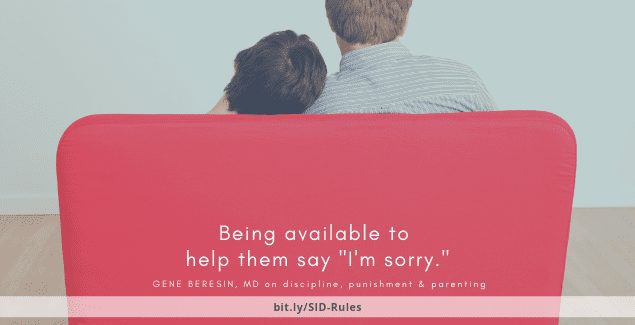Grounding Your Teen For a Month for Missing Curfew
Posted in: Multimedia, Teenagers, Videos, You & Your Family
Topics: Relationships
Chloe just got her driver’s license. With this, her father tells her, comes great responsibility. She will be expected to run errands. She will be expected to take her little brother to karate class. And, though she can now drive herself to her friends’ houses on the weekend, her curfew still stands—be home at 11:30pm or else, her father says.
Chloe excitedly agrees, and for the first few months, she is compliant with all of the stipulations that her parents put forth. Then, on a Friday night in late October, Chloe meets her friends at a party. The party drags on and on, and she loses track of time. Finally, after remembering to look at her phone, she makes as quick an exit as she is comfortable enacting. It’s 12:15am. She was supposed to be home more than half an hour ago.
Still, she doesn’t think much of this transgression. She’ll just tell her parents what happened, and given that her record is otherwise pretty spotless, there shouldn’t be a problem.
That’s why she is totally dumbfounded when she walks in the door, says hi to her still-awake father and mother, and finds herself grounded for a month without phone or car privileges.
“It’s not fair!” she screams, forgetting that she had planned on telling her parents what happened.
“You should have thought of that at 11:00pm last night,” her mother replies. And that’s that.
But does Chloe have a point? Probably.
And do her parents have a point? Probably.
To quote the nefarious warden in Cool Hand Luke, Chloe and her parents “have a failure to communicate.”
What gets in the way of that communication? For each party, the barriers are surprisingly different.
The Parent POV
Let’s look at Chloe’s parents’ point of view, first. I recall when I started driving. Every time I pulled into the driveway, my mother would rush out the door, and just lay eyes on me.
“You’re OK,” she would say, a firm grasp on the obvious it seemed to me.
But now, especially as a parent myself, I know that my mom was terrified. Think of the stress involved in allowing your child behind the wheel of a fast-moving and incredibly dangerous device. Think of the terror in knowing that your kid is driving. In studies of parents and their worries, concerns over their adolescent child driving tops the list. The Center for Disease Control even has an entire website devoted to how to talk to teenagers about safe driving.
So, we can assume that Chloe’s parents’ emotions are running high when she is late getting home. They’re going to nip this late arrival in the bud right away—and maybe in doing so, they overreacted.
The Teen POV
Now let’s look at Chloe’s point of view. She can’t imagine that this is that big of a deal. After all, she feels fine behind the wheel of a car. She’s been driving for over two months. She’s been safe, and she’s followed her parents’ rules. She wasn’t expecting the level of emotion that her parents displayed when she walked in late, and given her adolescent propensity to hear all comments as critical in the first place, she immediately exploded rather than trying to state her reasons for her late arrival.
In the world of teen transgressions, this isn’t really a big one, and both Chloe and her parents would agree with this at calmer moments. But in the world of worry and hurt feelings that existed when Chloe waltzed in at 12:15am, it was as if Chloe had entered a new reality.
So, a failure to communicate is at fault. And that’s really no one’s fault, since we all fail to adequately communicate all the time. The mistake when these things happen is to not go back and examine what transpired. This lack of re-examination leaves all parties under the impression of mistaken conclusions.
With regard to punishments, a good rule of thumb is to have the consequence match the transgression. Arriving home late for the first time doesn’t seem entirely congruent with a one-month grounding. Perhaps, a discussion needs to happen wherein everyone discusses what could have happened instead. Chloe could have called. Her parents could have texted.
They all need to talk.
Equally as important, it’s hard to know what Chloe’s father meant when he warned her that she better follow the rules “or else.” Or else what? Clearly stating as much as possible the consequences for unwanted behavior ahead of time will help Chloe to know more clearly what is expected of her.
Finally, remember that in the modern world of parenting, there are bigger fish to fry. Illicit substances, fake IDs, unprotected sex…these challenges are more worth the energy of her parents’ reactions. If the punishments are the same for all transgressions, then Chloe never learns to discriminate among transgressions.
Emotions run high when teens branch out and become more independent, and in that setting, decisions are made that could have been avoided if all parties had taken a deep breath and reconsidered. Even if the grounding is put in place, the next morning the family might sit down and talk about what happened, and then decide to change course. No one loses face if everyone understands.
There is a wonderful scene in the award-winning TV show Freaks and Geeks, where the father is trying to tell his teen daughter why he worries so much.
Father: …you’re my daughter. Every second you’re out of this house…every second that I can’t see you…or know what you’re doing…it’s…it’s absolute torture for me.
Daughter: Dad…I can’t stay inside all the time…
Father: I know…Why not?
And then they can smile and talk.
This article originally aired as an ABC News segment on 11/02/2009.

 Share
Share Tweet
Tweet






